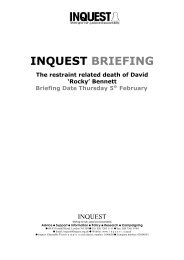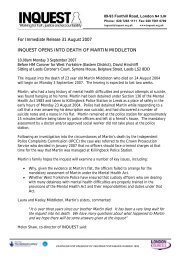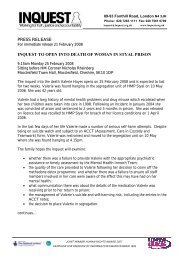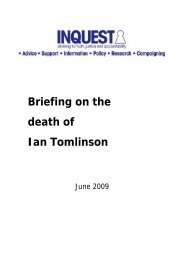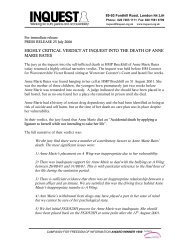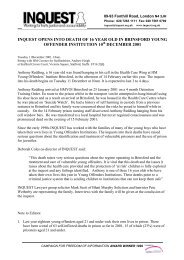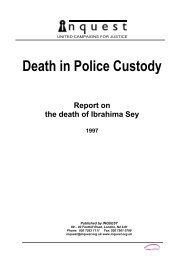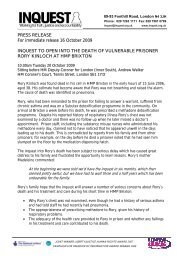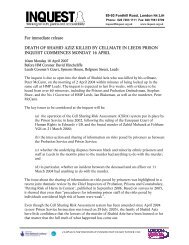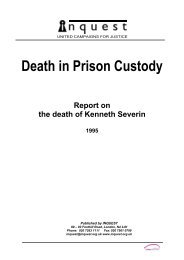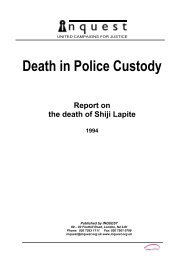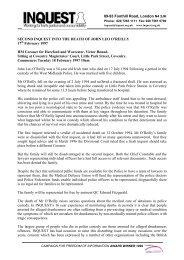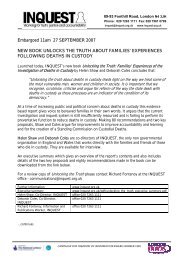Annual Report 2004 - Inquest
Annual Report 2004 - Inquest
Annual Report 2004 - Inquest
Create successful ePaper yourself
Turn your PDF publications into a flip-book with our unique Google optimized e-Paper software.
INQUEST<br />
<strong>Annual</strong> <strong>Report</strong> <strong>2004</strong>
2<br />
INQUEST<br />
<strong>Inquest</strong> Charitable Trust was established in 1995 to<br />
complement and assist the work of its sister organisation<br />
INQUEST that was set up in 1981. In March <strong>2004</strong> the two<br />
organisations merged and the single charitable organisation<br />
is known publicly as INQUEST. The <strong>Inquest</strong> Charitable<br />
Trust is a registered charity (number 1046650) and a<br />
company limited by guarantee (number 03054853).<br />
INQUEST has a staff team of eight and is the only<br />
organisation in England and Wales that provides a<br />
specialist, comprehensive advice service to bereaved<br />
people, lawyers, other advice and support agencies, the<br />
media, MPs and the wider public on contentious deaths<br />
and their investigation. INQUEST has a free information<br />
pack for any bereaved family that explains the whole<br />
process and where to find emotional and practical support.<br />
Our casework priorities are deaths in custody (police,<br />
prison, immigration detention and deaths of detained<br />
patients) and our focus on deaths in custody and the<br />
monitoring of such deaths means that we are at the<br />
forefront of uncovering patterns and trends. Arising from<br />
this we have particular concerns about the deaths of<br />
women, black people, children and young people, and<br />
people with mental health problems. This is both in terms<br />
of the treatment and care received by the deceased in<br />
custody and the experience of bereaved relatives following<br />
the death.<br />
We develop policy proposals and undertake research to<br />
lobby for changes to the inquest and investigation process,<br />
reduce the number of custodial deaths and improve the<br />
treatment and care of those within the institutions where<br />
the deaths occur.<br />
Volunteers *<br />
Staff<br />
Helen Shaw – co-director<br />
Deborah Coles – co-director<br />
Gilly Mundy – senior caseworker<br />
Catherine Hayes – caseworker from September <strong>2004</strong><br />
Melanie Lowe – office manager<br />
Marcie Shaoul – communications officer<br />
Richard Fontenoy – information worker<br />
Adam Barty – research assistant from December <strong>2004</strong><br />
Administration:<br />
Adam Barty<br />
Benjamin Coleman<br />
Laura Hale<br />
Benedict Irwin<br />
Parvin Jeyaraj<br />
Farhaz Khan<br />
Gladys Maimbolwa<br />
Mano Mazhowu<br />
Ugochi Okoronkwo<br />
Sundeep Pankhania<br />
James Plant<br />
Lata Singh<br />
Calvin Thomas<br />
Maria Stevenberg<br />
Hannah Kemp<br />
Putri Mohd Najib<br />
Women’s Deaths in Custody Project volunteer researcher:<br />
Fiona Wallace – one day per week from October <strong>2004</strong><br />
*most volunteers work at INQUEST for six weeks only<br />
Lucie Wibberley<br />
Kate McGhee<br />
Rebecca Linacre
3<br />
INQUEST Advisory Group<br />
<strong>Inquest</strong> Charitable Trust Board<br />
Louise Christian (Chair) Partner, Christian Khan Solicitors<br />
Adam Sampson (Deputy Chair) Director, Shelter<br />
Dr William Spence (Treasurer) Reader, Department of Physics, Queen Mary,<br />
University of London<br />
Reverend Arlington Trotman Secretary, Churches Commission for Racial Justice<br />
Dr Joanna Bennett Family member, Workforce Development Manager,<br />
Breaking the Circles of Fear, Sainsbury Centre for Mental Health<br />
Adrienne Jemmott Family member, Customer Advisor, Planning Reception,<br />
Reading Borough Council<br />
Dr Tony Ward Reader in Law at the University of Hull<br />
David Bergman Director, Centre for Corporate Accountability<br />
Professor Penny Green School of Law, University of Westminster<br />
Professor Joe Sim School of Social Science, Liverpool John Moores University<br />
Professor Phil Scraton Institute of Criminology and Criminal Justice,<br />
Queen’s University<br />
Raju Bhatt and Mark Scott Partners, Bhatt Murphy Solicitors<br />
Jonathan Glasson Barrister, Doughty Street Chambers<br />
Tim Owen QC Matrix Chambers<br />
Professor Mick Ryan Law Department, University of Greenwich<br />
Ruth Bundey Partner, Harrison Bundey Solicitors<br />
Dr Richard Stone Panel member of the David ‘Rocky’ Bennett Inquiry, President of<br />
the Jewish Council for Racial Equality and Vice-Chair of the Runnymede Trust<br />
Leslie Thomas Barrister, 2 Garden Court Chambers<br />
Dr Barry Goldson, Senior Lecturer, Department of Sociology, University of Liverpool
4<br />
January<br />
● Give oral evidence to<br />
the parliamentary Joint<br />
Committee on Human<br />
Rights Inquiry into Deaths<br />
in Custody following on<br />
from a comprehensive<br />
written submission<br />
● Paddy O’Connor QC<br />
addresses the INQUEST<br />
Lawyers Group on<br />
‘The Future of <strong>Inquest</strong><br />
Law’ in light of the Amin,<br />
Middleton and Khan<br />
cases<br />
Chair’s <strong>Report</strong> Louise Christian<br />
Once again this year INQUEST has been at the forefront of<br />
exposing a human rights scandal and tragedy – the number<br />
of preventable deaths in our overcrowded prisons,<br />
particularly of women and of children. The shameful failure<br />
of the government to take seriously the deaths of children in<br />
its care and its failure to set up a public inquiry into the<br />
death of Joseph Scholes despite calls by the coroner, cross<br />
party MPs and peers and the Parliamentary Joint Committee<br />
on Human Rights raises hard questions about its real moral<br />
priorities.<br />
INQUEST’s scarce resources are stretched by demands<br />
for comment and response from government and public<br />
bodies. Campaigns and casework are always the central<br />
focus of our organisation which is led as it always has been<br />
by the concerns of families and the issues arising from the<br />
deaths. INQUEST is unique in its ability to combine its<br />
casework service and its work at a strategic and policy level.<br />
But the lack of any focused approach by government
creates an impression that INQUEST is always being<br />
consulted but never listened to.<br />
In the meantime INQUEST’s public profile has never been<br />
higher and it continues to take centre stage in important<br />
public debates about accountability for controversial deaths<br />
and the nature of the inquest procedure. We await the<br />
response to the White Paper on Coroners Reform with the<br />
very real fear that lack of government resources will inhibit<br />
any will for substantive reform.<br />
INQUEST’s dedicated staff have continued to serve it well<br />
this year and there has been a very modest increase in the size<br />
of the organisation. Once again Deborah Coles and Helen<br />
Shaw have led on a range of important policy issues and on<br />
the most controversial cases. Gilly Mundy has continued to<br />
cope with the ever increasing mass of urgent casework, joined<br />
from September <strong>2004</strong> by Catherine Hayes. Marcie Shaoul,<br />
communications officer, has maintained excellent links with<br />
the media and the campaigning profile. From December <strong>2004</strong><br />
Adam Barty is assisting on a research project. Information<br />
worker Richard Fontenoy ensures incoming information is<br />
analysed and monitored and Melanie Lowe, the administrator,<br />
continues to hold it all together. My heartfelt thanks to all of<br />
them and to all who support INQUEST in the important work<br />
it does.<br />
5
6<br />
Banner of Rocky Bennett campaign at UFFC March, October <strong>2004</strong><br />
February<br />
● Launch of the <strong>Report</strong> of<br />
the Independent Inquiry<br />
into the Death of David<br />
`Rocky’ Bennett in<br />
psychiatric detention<br />
which finds NHS mental<br />
health services<br />
institutionally racist and<br />
recommends a threeminute<br />
time limit on prone<br />
restraint<br />
● INQUEST makes crucial<br />
third party intervention into<br />
the Middleton case in<br />
House of Lords on selfinflicted<br />
deaths in prison<br />
and the need for<br />
meaningful conclusions<br />
following inquests<br />
● Attend the Ministerial<br />
Round Table on Suicide in<br />
Prison at HMP New Hall<br />
Co-Directors’ <strong>Report</strong><br />
Deborah Coles & Helen Shaw<br />
“Someone is either killed, kills themselves or dies in<br />
otherwise questionable circumstances – every other day.<br />
That – quite frankly – is shocking”.<br />
Parliamentary Joint Committee on Human Rights (JCHR)<br />
<strong>Report</strong> – Deaths in Custody, December <strong>2004</strong>.<br />
We have had an extremely busy, challenging and<br />
contradictory year. Alongside the continuing high number<br />
of deaths in custody requiring our in-depth casework<br />
service we have seen an increased demand for our<br />
response at a policy and parliamentary level. Political,<br />
media and public concern about deaths in custody – in<br />
particular of young people and women in prison – has<br />
never been higher. The high number of deaths of children
7<br />
and women has involved significant parliamentary, policy<br />
and media work to raise public awareness about the issues<br />
involved. Increasingly this year we have seen our concerns<br />
acknowledged and reflected by others in the field.<br />
Significant legal and policy decisions have also impacted<br />
on the investigation of contentious deaths.<br />
The staff team has grown, the profile and reach of the<br />
organisation has been unprecedented and the<br />
collaborative work we have engaged in has also been very<br />
successful. The numbers of people accessing our service<br />
has increased in part due to the successful redesign of the<br />
website making on-line material available to a wide<br />
audience. Our seminars have reached staff working with<br />
bereaved people and given them an increased<br />
understanding of the issues affecting families attending<br />
inquests. New systems of investigation have started for<br />
deaths in both prison and in police custody.<br />
Parliamentary Inquiry into Deaths in Custody<br />
The parliamentary JCHR Inquiry into Deaths in Custody<br />
was a key area of work in <strong>2004</strong> as we made ongoing<br />
contributions to the Committee during their year long<br />
deliberation highlighting areas of concern as they<br />
emerged. We made two substantial and detailed written<br />
submissions and gave oral evidence to the Inquiry.<br />
We co-ordinated a meeting for bereaved families, whose<br />
relatives had died in custody, to meet members of the<br />
Committee and to tell them personally about their<br />
experiences. This clearly impacted on the final report.<br />
Their findings and recommendations published in<br />
December <strong>2004</strong> are a vindication of INQUEST’s long<br />
held and expressed concerns about deaths in custody<br />
and their investigation.<br />
INQUEST believes that the failure to learn the lessons<br />
from deaths occurring in different custodial settings and<br />
the lack of joined up learning and thinking between<br />
agencies has resulted in more deaths and the ongoing<br />
poor treatment of families. We recommended to the JCHR<br />
Inquiry the setting up of a Standing Commission on<br />
Custodial Deaths to bring together the experiences from<br />
the separate investigation bodies as the most effective way<br />
to prevent or minimise future violations of Article 2 of the<br />
European Convention on Human Rights (ECHR). In its<br />
conclusions the Committee acknowledged our views,<br />
recommending that the government should “establish a<br />
cross-departmental expert task-force on deaths in custody.<br />
This should be an active, interventionist body, not a<br />
talking-shop, with its membership drawn from people<br />
with practical working experience of the problems<br />
associated with deaths in custody.”
8<br />
March<br />
● Lobby Metropolitan<br />
Police Authority regarding<br />
funding for Roger<br />
Sylvester family’s legal<br />
representation at the<br />
police officers’ challenge<br />
by way of judicial review<br />
of the unlawful killing<br />
verdict<br />
● Host first Sudden<br />
Death Forum – bringing<br />
together key voluntary<br />
organisations working in<br />
the area to discuss<br />
casework processes<br />
● Meet Rosie Winterton<br />
MP, Minister of State at<br />
the Department of Health<br />
about taking forward the<br />
Bennett Inquiry<br />
recommendations<br />
● Speak at a National<br />
Bereavement Partnership<br />
workshop on consent and<br />
post-mortems<br />
● Attend the launch of the<br />
report of the Fawcett<br />
Society Commission on<br />
Women and Criminal<br />
Justice after giving oral<br />
evidence on the deaths of<br />
women in custody<br />
David ‘Rocky’ Bennett<br />
In February, following the publication of the Independent<br />
Inquiry <strong>Report</strong> into the [restraint related] Death of David<br />
‘Rocky’ Bennett, the government began a process that<br />
should result in fundamental changes in the delivery of<br />
services to people from black and minority ethnic<br />
communities within mental NHS health services. Working<br />
alongside the family to ensure the government acts upon<br />
the recommendations of the inquiry has been a key task<br />
this year.<br />
Deaths of Women in Prison<br />
In April we started a key two-year project looking at the<br />
issues arising from the deaths of women in prison.<br />
We have systematically raised our concerns in a number<br />
of public forums including the JCHR Inquiry, various<br />
academic conferences and the Fawcett Society<br />
Commission on Women and the Criminal Justice System.<br />
Alongside this we have continued to ensure the issue has<br />
been addressed at the regular Ministerial Round Table on
9<br />
Suicide in Prison and have frequently briefed MPs for<br />
parliamentary debates and questions. We have also<br />
achieved high profile media coverage of the issue.<br />
Breakthrough in <strong>Inquest</strong> Law<br />
In March the ruling in the House of Lords in the cases of<br />
Middleton and Sacker relating to two self-inflicted deaths<br />
in prison was a major breakthrough for inquest law.<br />
INQUEST’s third party intervention was important in<br />
drawing the Lords’ attention to the context in which<br />
these deaths take place; the escalating number of selfinflicted<br />
deaths in custody; the fact that aside from<br />
hospitals there is no other area of State responsibility<br />
where so many people die from potentially preventable<br />
causes; and the shortcomings of the inquest system in<br />
delivering meaningful conclusions about the<br />
responsibility of State agencies in relation to those deaths.<br />
It has already resulted in a change in the way inquests are<br />
conducted, particularly in the way verdicts are formed.<br />
<strong>Inquest</strong> juries now have more opportunity to draw<br />
attention to any failings in the circumstances surrounding<br />
the death through the use of more narrative verdicts.<br />
This could result in a more meaningful conclusion to the<br />
inquest for families and all other parties.<br />
The significance of this judgment was seen at the<br />
conclusion of the inquest into the death of 16-year-old<br />
Joseph Scholes who died in Her Majesty’s Young Offenders<br />
Institute (HMYOI) Stoke Heath. The jury returned a<br />
verdict of “accidental death in part contributed because the<br />
risk was not properly recognised or appropriate<br />
precautions were not taken to prevent it”. In an<br />
unprecedented move the coroner recommended that a<br />
public inquiry be set up to examine in particular<br />
sentencing policy with regard to children as this was an<br />
area that was outside of the inquest’s remit.<br />
This was a meaningful conclusion to an inquest that<br />
heard very disturbing evidence about systemic failures to<br />
protect a vulnerable and damaged child while in the care<br />
and custody of the State. We ran a hard hitting and highly<br />
successful campaign with Nacro throughout the year to<br />
lobby government to set up the public inquiry.<br />
Investigation of Deaths in Prison and Police Custody<br />
Since 1 April, the Independent Police Complaints<br />
Commission (IPCC) and the Prisons and Probation<br />
Ombudsman (PPO) have taken over the investigation of<br />
deaths in custody. We have concerns about the<br />
independence of the PPO and their ability to appropriately<br />
communicate and consult with those representing bereaved<br />
families. This is particularly a matter of concern in relation<br />
to family liaison and the PPO has also refused to distribute<br />
our specialist leaflet What to do when someone you know
10<br />
April<br />
● Present paper at<br />
Nacro Race Advisory<br />
Committee on black<br />
deaths in custody<br />
● Provide background<br />
briefings for House of<br />
Lords debate on Joseph<br />
Scholes<br />
● Present paper on<br />
‘deaths of women in<br />
prison: the issues’<br />
alongside mother of<br />
Sarah Campbell who<br />
died in Styal prison at the<br />
European Group for the<br />
Study of Deviance and<br />
Social Control – Crime,<br />
Justice and Punishment<br />
and the City: Global,<br />
Transnational and Local<br />
Perspectives<br />
● Attend press launch<br />
and conduct media work<br />
on BBC programme<br />
Death on Camera –<br />
Christopher Alder.<br />
Screening generates<br />
huge publicity for<br />
INQUEST<br />
● Speak at Roger<br />
Sylvester Justice<br />
Campaign public<br />
meeting<br />
● Joseph Scholes<br />
inquest starts and lasts<br />
for three weeks – attend<br />
the inquest, assist with<br />
legal preparation, coordinate<br />
media work and<br />
support family<br />
● Attend launch of antiracist<br />
festival RESPECT<br />
at City Hall<br />
dies in prison to bereaved families. This is in stark contrast<br />
to the IPCC. Following some initial resistance, INQUEST<br />
gave a presentation to the IPCC after which they agreed to<br />
give families our specialist advice leaflets following any<br />
deaths in police custody. This will enable families to access<br />
advice from INQUEST and our Lawyers Group members<br />
at an early stage.<br />
Justice? What Justice?<br />
The outcomes of two legal processes towards the end of<br />
<strong>2004</strong> seriously undermined any sense of progress and<br />
families’ confidence in the legal system to deliver justice.<br />
Harry Stanley<br />
In October the jury in the second inquest into the death of<br />
Harry Stanley returned an unlawful killing verdict. Harry<br />
Stanley was shot dead by Metropolitan police officers in<br />
September 1999.<br />
The Stanley family had already had to endure an inquest<br />
in June 2002 where the coroner denied the jury the
11<br />
opportunity to hear from firearms experts and to consider<br />
whether Mr Stanley had been unlawfully killed. The<br />
October <strong>2004</strong> inquest has revealed the truth about how an<br />
unarmed man could be shot dead and has held those<br />
responsible properly to account.<br />
But following the verdict police officers from SO19<br />
Firearms Unit ceased carrying their firearms in response to<br />
the inquest verdict. This caused a media furore and led to<br />
public calls to change the law when applied to police<br />
officers.<br />
SO19 officers appear to have been misled by the Police<br />
Federation into seeing the verdict as a jury second-guessing<br />
a split second decision taken by officers who opened fire<br />
believing themselves to be in imminent danger of being<br />
shot at. That was simply what these officers claimed in<br />
their evidence. Had the jury accepted the officers’ evidence<br />
(i.e. that the officers believed they were under imminent<br />
threat) the jury would never have returned a verdict of<br />
unlawful killing. The coroner gave a clear summing up,<br />
explained in the fullest terms the seriousness of such a<br />
verdict and the high standard of proof required. The jury<br />
considered their verdict for over seven hours.<br />
No-one is beyond the law. SO19 officers and their<br />
leaders should not have tried to apply pressure on the<br />
Crown Prosecution Service (CPS), IPCC or their<br />
employers to give some kind of immunity to the officers in<br />
the Stanley case or any person who does not act in lawful<br />
self-defence. Where police officers kill members of the<br />
public they must be held to account openly and<br />
transparently. The rule of law must be seen to apply<br />
equally to all citizens, including those in police uniform.<br />
Roger Sylvester<br />
On 26 November the unlawful killing verdict returned by<br />
an independent jury at the inquest into the death of Roger<br />
Sylvester in 2003, was formally quashed in the High Court<br />
by Mr Justice Collins. He said the summing up by the<br />
coroner was defective and that some of the reasons the jury<br />
gave for their verdict were inconsistent. Roger Sylvester<br />
died as the result of being handcuffed and restrained for<br />
around 20 minutes by up to six Metropolitan police<br />
officers who had detained him under the Mental Health<br />
Act. On the evidence heard at the inquest the judge<br />
accepted that the jury could have returned an unlawful<br />
killing verdict, finding that Roger had died from brain<br />
damage and cardiac arrest related to his unlawful and<br />
excessive restraint. But, because of errors by the coroner<br />
and jury, the verdict has been quashed. In other words the<br />
family has had an unlawful killing verdict taken away by a<br />
legal technicality. Once again the message is sent out that
12<br />
Roger Sylvester Justice Campaign banner<br />
May<br />
● Family of Christopher<br />
Alder picket the Home<br />
Office to demand public<br />
inquiry<br />
● Co-ordinate meeting of<br />
families bereaved by<br />
deaths in custody with<br />
members of the<br />
parliamentary Joint<br />
Committee on Human<br />
Rights<br />
● Host first INQUEST<br />
seminar Bereaved People<br />
and <strong>Inquest</strong>s – working<br />
with clients affected by<br />
the inquest system – in<br />
London<br />
● Meet with Prisons and<br />
Probation Ombudsman<br />
about their investigation<br />
of prison deaths<br />
● Meet with senior<br />
Department of Health<br />
officials and again with<br />
Rosie Winterton MP,<br />
Minister of State, about<br />
the government response<br />
to the Bennett Inquiry<br />
● Speak on black deaths<br />
in custody at the<br />
‘Criminology in the New<br />
Millenium’ Conference –<br />
Race, Criminal Justice<br />
and Gender<br />
● Meet with Chris Ruane<br />
MP about the call for<br />
public inquiry into the<br />
death of Joseph Scholes<br />
police officers involved in fatal restraint are seen to be<br />
above the law and families whose loved ones have died as a<br />
result of excessive and unlawful force can get no justice<br />
and accountability. The Roger Sylvester Justice Campaign<br />
continues to highlight the injustices suffered by the family.<br />
Families’ Experiences of Deaths in Custody<br />
INQUEST’s Nuffield Foundation funded project on<br />
families’ experiences following deaths in custody has<br />
drawn extensively on the work outlined. The report will be<br />
published in 2005 and will draw attention to continuing<br />
thematic problems across all areas of custody.<br />
Reform of the <strong>Inquest</strong> System<br />
During the year we have been in an ongoing dialogue with<br />
the Home Office about the proposed reform of the inquest<br />
system. In March the government announced proposals on<br />
reforming the coroner and death certification service in<br />
response to the report of the Fundamental Review of<br />
Coroner Services and the Shipman Inquiry. A position<br />
paper was published that proposes a national system
13<br />
Other 48<br />
Prison<br />
68<br />
Police 18<br />
New<br />
Cases<br />
Total: 245<br />
Other159<br />
Police 56<br />
Cases<br />
Brought<br />
Forward<br />
Total: 225<br />
Prison<br />
121<br />
based around full time independent legally qualified<br />
coroners. INQUEST welcomed the commitment to make<br />
the system sensitive to the needs of the bereaved. How<br />
much of a continuing political priority this is for the<br />
government in the run up to a general election in 2005<br />
remains to be seen.<br />
Significant legal developments are having a positive<br />
impact on the conduct of inquests that engage Article 2 of<br />
the ECHR and many coroners are embracing the current<br />
opportunities for change. But this is being hampered by the<br />
lack of progress in implementing the necessary policy<br />
changes. Many coroners are suffering acute problems with<br />
a lack of resources resulting in considerable delay in<br />
inquests being heard; there are still too many hurdles in the<br />
way of public funding for legal preparation and<br />
representation for bereaved families and in some<br />
circumstances the new investigation systems do not allow<br />
families to effectively participate.<br />
The government is expected to publish a White Paper<br />
on reform of the inquest system in the spring of 2005.<br />
We hope the government will rise to the challenge of<br />
ensuring the new inquest and investigation systems can<br />
deliver a 21st Century service that acknowledges and<br />
respects the needs of bereaved families and the truth.<br />
New<br />
Clients<br />
330<br />
Clients<br />
<strong>2004</strong><br />
Total: 721<br />
Brought<br />
Forward<br />
391<br />
Police 74<br />
Prison 189<br />
All<br />
Cases<br />
Total: 470<br />
Casework <strong>2004</strong><br />
Casework<br />
Casework forms the core of INQUEST’s work. This year<br />
our casework focus has been particularly on the deaths of<br />
children and young people and the deaths of women in<br />
prison because of the high numbers and also because we<br />
are working on two significant projects due for completion<br />
in 2006.<br />
Casework Service<br />
INQUEST monitors all deaths in custody and identifies<br />
themes and patterns that arise from these deaths:<br />
subsequently our casework priorities reflect these issues of<br />
concern.<br />
The charts above show the number of people we have<br />
advised and the number of cases we are working on.<br />
Other<br />
207
14<br />
June<br />
● Meet with the Coroners<br />
Reform Team at the Home<br />
Office<br />
● Host second INQUEST<br />
seminar Bereaved People<br />
and <strong>Inquest</strong>s – working<br />
with clients affected by<br />
the inquest system in<br />
Manchester<br />
● Stephen Cragg<br />
addresses the INQUEST<br />
Lawyers Group meeting<br />
on ‘Putting Middleton and<br />
Sacker into Practice’<br />
● INQUEST Chair<br />
Louise Christian wins<br />
Independent Legal Aid<br />
Lawyer of the Year Award<br />
● Meet with Department<br />
of Health officials about<br />
progress on government<br />
response to Bennett<br />
Inquiry <strong>Report</strong><br />
● Jointly host Family<br />
Forum with United Friends<br />
and Family Campaign in<br />
Birmingham<br />
The aim of our casework service is to advise families and<br />
empower them through the provision of information and<br />
advice about their rights. Because of the length of time from<br />
the death to the conclusion of the investigation and inquest<br />
process, our support can last for a number of years.<br />
General Advice<br />
We operate a telephone based service offering free support,<br />
advice and information to all bereaved people facing an<br />
inquest on their basic rights in the coroner’s court. There is<br />
no other organisation in England and Wales with such<br />
specialist knowledge about the inquest system. Our<br />
informed casework team provides this specialist advice as<br />
well as sending out written information – our<br />
comprehensive Information Pack and leaflets concerning<br />
specific circumstances of death. We also provide<br />
information to bereaved people about how to access other<br />
services and in many non-custody related deaths we will<br />
provide both advice and referrals to other organisations<br />
e.g. road traffic related deaths to RoadPeace, work related
15<br />
deaths to the Centre for Corporate Accountability, deaths<br />
in hospital to Action against Medical Accidents (AvMA).<br />
We also monitor any legal issues arising from these cases<br />
that concern the inquest system.<br />
Deaths in Custody<br />
We provide an in-depth casework service when an inquiry<br />
falls within one of our priority areas – prison and police<br />
custody and psychiatric or immigration detention.<br />
We have a particular focus on the deaths of people from<br />
black and minority ethnic communities, young people,<br />
women and people with mental health problems. This<br />
service involves arranging legal representation for a<br />
family and then working as an integral part of the legal<br />
team, advising and supporting lawyers, providing detailed<br />
background information on similar cases. In some cases<br />
we arrange meetings with MPs, carry out press and media<br />
work, attend the inquest and follow up the issues that<br />
emerge. This can include verbal and written submissions<br />
to parliamentary inquiries and the production of briefing<br />
papers as well as supporting individual family campaigns.<br />
However because of the continuing high number of<br />
prison deaths it is not possible to provide this level of<br />
service in all cases due to the size of our staff team.<br />
Self-Inflicted<br />
95<br />
Non-Self-<br />
Inflicted 107<br />
Deaths<br />
in Prison<br />
Custody<br />
<strong>2004</strong><br />
Homicide 2<br />
Awaiting Classification 2<br />
All deaths in Prison 208 Of which were black deaths 21<br />
New Caseworker<br />
Although in September we employed a new full time<br />
caseworker which has enabled us to attend more inquests,<br />
make contact with and provide advice to more families we<br />
are still unable to provide the in-depth service described in<br />
anything but a small number of cases. We do ensure that<br />
families have access to experienced lawyers who we are in<br />
regular dialogue with and brief us on any issues arising<br />
from the death and its investigation.<br />
Family Forum<br />
We held two Family Forums this year, one in London and<br />
the other in Birmingham. The Family Forum is an informal<br />
meeting that brings together those who have received<br />
assistance from INQUEST to meet others who have faced<br />
similar experiences and for mutual support.
16<br />
Deborah Coles, co-director, INQUEST, Hilton Dawson MP, Lord Navnit Dholakia<br />
All Children’s Deaths (aged 17 and under)<br />
in Penal Custody 1990 – <strong>2004</strong> *<br />
4<br />
July<br />
● New caseworker<br />
appointed<br />
● Meet with Rosie<br />
Winterton MP, Minister of<br />
State about the<br />
government response to<br />
Bennett Inquiry <strong>Report</strong><br />
● Present a paper on<br />
working with bereaved<br />
families at the Ministerial<br />
Round Table on Suicide<br />
in Prison held at HMP<br />
Nottingham<br />
● Assist in drafting of the<br />
Early Day Motion calling<br />
for a public inquiry into<br />
the death of Joseph<br />
Scholes which is then<br />
tabled by Chris Ruane MP<br />
● Questionnaire sent to<br />
families bereaved by<br />
deaths in custody for<br />
research project<br />
● Host Family Forum in<br />
London<br />
● Make a presentation to<br />
members of the<br />
Independent Police<br />
Complaints Commission<br />
on INQUEST’s work with<br />
families following deaths<br />
in police custody<br />
● Meet with MPs<br />
regarding the death of<br />
15-year-old Gareth Myatt<br />
in a secure training centre<br />
● Attend funeral of Paul<br />
Foot, longstanding friend<br />
and patron of INQUEST<br />
3<br />
2<br />
1<br />
0<br />
19901991 1992 1993 1994 1995 1996 1997 1998 1999 2000 20012002 2003 <strong>2004</strong><br />
3 1 1 1 2 3 1 1 3 2 3 3 2 0 2<br />
* two of these deaths occurred in secure training centres<br />
Deaths of Children and Young People in Custody<br />
As we are working on a three year project on the deaths of<br />
children and young people in custody and because of<br />
ongoing and rising concern about these deaths this has<br />
been a priority area of work during <strong>2004</strong>. The continued<br />
call for a public inquiry into the death of 16-year-old<br />
Joseph Scholes who died on 24 March 2002 in HMYOI<br />
Stoke Heath and the restraint related death of 15-year-old<br />
Gareth Myatt on 19 April <strong>2004</strong> in Rainsbrook Secure<br />
Training Centre underlined the need for this work. This
17<br />
was exacerbated by the death of 14-year-old Adam<br />
Rickwood on 9 August <strong>2004</strong> in Hassockfield Secure<br />
Training Centre. Adam became the youngest ever child to<br />
die in penal custody in recent times. Within days of<br />
hearing about these two deaths, the casework team at<br />
INQUEST had managed to find the families of Adam and<br />
Gareth experienced solicitors. We also responded to<br />
extensive media interest in the cases.<br />
Until we made contact with the two families, neither<br />
had been given access to any independent advice and<br />
support from any of the official agencies involved. It<br />
became apparent that the Youth Justice Board – who are<br />
responsible for secure training centres – had no<br />
protocols in place to deal with the aftermath of a death<br />
including no procedure about family support. Gareth<br />
Myatt’s mother was unaware of her legal rights both in<br />
relation to a second post-mortem and in terms of<br />
instructing a solicitor. Our intervention meant that at a<br />
time when she was emotionally distraught about<br />
Gareth’s death we were able to arrange a second postmortem<br />
and the subsequent release of her son’s body so<br />
that she could arrange the funeral. We also put the<br />
families involved in contact with each other for mutual<br />
support.<br />
Parliamentary Meeting<br />
In November INQUEST and Nacro held a joint<br />
parliamentary briefing meeting to call for a public inquiry<br />
into the death of 16-year-old Joseph Scholes who died in<br />
HMYOI Stoke Heath. The meeting was chaired by Lord<br />
Navnit Dholakia with speakers Hilton Dawson MP, Deborah<br />
Coles, co-director of INQUEST and Yvonne Scholes, mother<br />
of Joseph. The meeting focused on the shocking issues<br />
surrounding Joseph’s death and the treatment of children in<br />
the criminal justice system. INQUEST and Nacro produced<br />
a comprehensive briefing paper in October highlighting the<br />
key issues. It was widely disseminated and downloaded from<br />
our website 102 times. We also briefed the media prior to<br />
the meeting and attendance on the day was high. 111 MPs<br />
signed an Early Day Motion tabled by Chris Ruane MP after<br />
much lobbying by email, letter and telephone. This<br />
campaign has received widespread cross party support in the<br />
Commons and Lords and from children’s rights and prison<br />
reform organisations and was endorsed by the JCHR in<br />
December <strong>2004</strong>. We continue to lobby the government for a<br />
public inquiry into Joseph’s death and an examination into<br />
all deaths of children in penal custody. For a full list of<br />
supporters please look at www.inquest.org.uk<br />
As part of our work around the deaths of young people<br />
INQUEST attended a vigil to mark the 20th birthday of<br />
Anthony Redding. Anthony was 16 years old when he was<br />
found hanging in HMYOI Brinsford. The vigil was<br />
attended by other bereaved families including the mothers
18<br />
Pauline Campbell and others protest about women’s deaths in prison. Picture: Manchester Evening News<br />
Deaths Of Women In Prison <strong>2004</strong><br />
August<br />
● Issue press release<br />
following the death of 14-<br />
year-old Adam Rickwood,<br />
the youngest person to<br />
die in penal custody and<br />
respond to significant<br />
media interest<br />
● Meet with Nigel<br />
Hancock from the Safer<br />
Custody Group to raise<br />
ongoing concerns about<br />
deaths in prison<br />
Non-Self-Inflicted 8<br />
Self-Inflicted 13<br />
of Joseph Scholes and Gareth Myatt. The families laid<br />
flowers in memory of Anthony and released 27 balloons<br />
representing each child who had died in custody since<br />
1990. The vigil received good press coverage and provided<br />
an opportunity for families to meet each other.<br />
Deaths of Women in Prison<br />
In April we started a two-year research project on the<br />
deaths of women in prison which coincided with a record<br />
14 self-inflicted deaths of women in 2003 and continuing<br />
high numbers of deaths in <strong>2004</strong> when 13 women took their<br />
own lives. Women account for only 6% of the average daily<br />
prison population and yet made up 14% of the self-inflicted
19<br />
deaths in prison in <strong>2004</strong>. Because of our concern about the<br />
number of deaths and the start of the project we were<br />
proactive in ensuring that our information reached those<br />
families that needed it and we have sent letters<br />
accompanying Information Packs via the prison service and<br />
coroner’s courts. As a direct result 17 of those families have<br />
contacted us and we are now working with them. Some of<br />
them are families of women who died in 2003 who had not<br />
previously been made aware by official sources of<br />
INQUEST’s service.<br />
The <strong>Inquest</strong> System<br />
Narrative verdicts<br />
INQUEST is monitoring all narrative verdicts returned at<br />
inquests following the Middleton case mentioned earlier in<br />
the report. This is an extremely useful resource for lawyers<br />
and others as there is no central official collation and<br />
monitoring of such verdicts. Many lawyers are unaware of<br />
the significance of the judgment and how it is being applied<br />
at inquests and the important contribution it can make in<br />
highlighting individual and systemic failings. This is an<br />
evolving area of inquest law and our monitoring of the<br />
verdicts should reveal its impact. Below are two examples<br />
of cases where narrative verdicts were returned.<br />
Anna Baker<br />
Anna Baker was the second of six women to die in a 12-<br />
month period at HMP Styal. Anna died in November 2002<br />
and the inquest into her death took place in November <strong>2004</strong>.<br />
Anna was on remand and was recognised as being at risk<br />
from suicide and self-harm. Anna was withdrawing from<br />
drugs. The day before her death she was moved from her<br />
shared cell to a single cell. The jury’s critical narrative verdict<br />
found the initial admission assessment into the prison was<br />
inadequate in light of Anna’s vulnerability and that there<br />
appeared to be a total lack of awareness and staff training in<br />
the management of her being at risk of suicide and self-harm.<br />
John Hinde<br />
Greater Manchester Police approached John Hinde’s vehicle<br />
which they had seen driving erratically and stop on a slip<br />
road of the M6 in Lancashire. During a struggle in which<br />
John was restrained in the prone position he lost<br />
consciousness. The officers were aware that John had<br />
concealed a package they believed to be illicit drugs in his<br />
mouth. The inquest heard evidence that the arresting<br />
officers, despite knowing that he was unconscious and in<br />
possible danger from the package in his mouth, failed to<br />
provide adequate first aid. The jury returned a critical<br />
narrative verdict highlighting concerns about the police<br />
officers’ treatment of John and in particular about the<br />
inadequacy of their first aid training and implementation of<br />
their own procedures.
20<br />
September<br />
● INQUEST debate with<br />
the Prisons Minister on<br />
Radio 5 Live about deaths<br />
of women in custody<br />
● Attend recording of<br />
INQUEST’s BBC Radio 4<br />
Charitable Appeal with<br />
Benjamin Zephaniah<br />
● New caseworker starts<br />
● Attend Inns of Court<br />
School of Law pro bono<br />
student fair to recruit<br />
volunteers<br />
● Join delegation from<br />
the Law Society and<br />
Action against Medical<br />
Accidents (AvMA) to meet<br />
officials from the<br />
Department of<br />
Constitutional Affairs and<br />
the Legal Services<br />
Commission about<br />
ongoing problems with<br />
public funding and<br />
inquests<br />
● Attend Judicial Studies<br />
Board coroners training<br />
day on inquests into<br />
deaths in prison post the<br />
Middleton and Amin<br />
judgments<br />
● Meet with MPs to brief<br />
them on the issues arising<br />
out of the deaths of<br />
children in custody<br />
● Attend and speak at a<br />
Children’s Society Fringe<br />
meeting at Labour Party<br />
conference on children’s<br />
deaths in prison<br />
● Meet with the Youth<br />
Justice Board on the death<br />
of Adam Rickwood<br />
Delays in <strong>Inquest</strong>s<br />
One of INQUEST’s key concerns about the way in which<br />
deaths in custody are investigated is the serious delay that<br />
can occur from the time of death through to the subsequent<br />
inquest. Delays of over a year are not uncommon – in part<br />
due to the length of time investigations can take and the<br />
lack of resources available to coroners.<br />
These delays cause bereaved people great distress and<br />
the casework team have identified the detrimental effects<br />
of these delays on the physical and mental health of family<br />
members. The opportunity for identifying what went<br />
wrong, learning the lessons and preventing other deaths<br />
also become seriously prolonged. We have raised our<br />
concerns about this at a policy and parliamentary level.<br />
Funding for Families’ Legal Representation<br />
We continue to deal with ongoing problems in obtaining<br />
public funding for legal preparation, representation and<br />
subsistence for families and inconsistent practice around<br />
the country. The reforms to the system that have provided
21<br />
Shooting 2<br />
All Forces<br />
some public funding for representation at inquests into<br />
deaths in custody are welcome, but they are not enough.<br />
Although public funding is now available for these inquests<br />
families still have to go through means testing, though even<br />
to get to this stage there is a protracted and intrusive legal<br />
process. This is in stark contrast to the State whose lawyers<br />
have unlimited and unrestricted access to State resources.<br />
Increasingly prison officers and prison doctors are<br />
represented through their union or professional funding.<br />
Deaths in Police Custody<br />
This year there has been a fall in the numbers of deaths in<br />
police custody although <strong>2004</strong> saw a number of important<br />
inquests and judicial reviews of cases of deaths from<br />
previous years.<br />
Restraint Related Deaths<br />
Our casework this year has highlighted the continued use<br />
and dangers of prone restraint in police custody as<br />
illustrated by the death of John Hinde, already detailed<br />
above, and the three week inquest into the death of Giles<br />
Freeman. Giles died in November 2002 whilst being<br />
restrained at Slough police station after he had been<br />
sectioned under the Mental Health Act. The inquest raised<br />
Police<br />
Vehicle<br />
Incidents<br />
24<br />
Deaths<br />
In Police<br />
Custody<br />
<strong>2004</strong><br />
All deaths 66 Of which are black deaths 3<br />
All custody deaths 40<br />
a number of concerns relating to the use of prone restraint,<br />
the management and care of mentally ill patients and the<br />
unsuitability of police stations as a place of safety.<br />
Medical Care in Police Stations<br />
We have also monitored the quality of care provided in<br />
police station custody suites. A number of cases raised the<br />
inadequate provision of medical care to those vulnerable<br />
due to their drug and alcohol use. The police still fail in<br />
their duty to call Forensic Medical Examiners (police<br />
doctors) to cells to assess the needs of these detainees<br />
leaving many of them to suffer the symptoms of withdrawal<br />
without early medical intervention.<br />
Deaths Involving Police Vehicles<br />
Incidents of deaths as a result of police vehicles remain<br />
disturbingly high despite a drop from the record number in<br />
2003. INQUEST welcomes the increased use of ‘black box’<br />
technology in police vehicles. However this remains<br />
inconsistent and sporadic across all forces.
22<br />
UFFC on the march<br />
October<br />
● Stephen Shaw Prisons<br />
and Probation<br />
Ombudsman addresses the<br />
INQUEST Lawyers Group<br />
meeting on Investigating<br />
Deaths in Prison<br />
● Hold well attended<br />
workshop at the European<br />
Social Forum on the<br />
struggles of families for<br />
justice following deaths in<br />
custody<br />
● Meet with Prison<br />
Inspectorate on issues<br />
arising from recent inquests<br />
into deaths in prison<br />
● Dr Joanna Bennett, sister<br />
of David ‘Rocky’ Bennett<br />
and INQUEST Board<br />
member wins Mental<br />
Health Media Award<br />
● Christopher Alder’s family<br />
win permission to judicially<br />
review the Home Secretary’s<br />
decision not to hold public<br />
inquiry<br />
● Present paper on the<br />
issues arising from<br />
INQUEST’s work on deaths<br />
in custody at Capita<br />
Conference ‘Deaths in Police<br />
Care’<br />
● Attend sixth annual UFFC<br />
procession<br />
● Attend vigil in memory of<br />
16-year-old Anthony<br />
Redding at HMYOI Brinsford<br />
● Harry Stanley unlawful<br />
killing verdict returned and<br />
armed police officers in<br />
Metropolitan Police SO19<br />
Firearms Unit lay down<br />
weapons in protest at verdict<br />
INQUEST Lawyers Group<br />
We advise lawyers on both procedural and tactical matters<br />
and we encourage those we advise to become members of<br />
our INQUEST Lawyers Group (ILG), a national pool of<br />
solicitors and barristers who are willing and able to<br />
provide preparation and legal representation for bereaved<br />
families. Our Lawyers Group is made up of committed,<br />
experienced barristers, solicitors and law students<br />
including the leading inquest and human rights<br />
practitioners in the country. ILG members now have access<br />
to an email group in which ideas and questions are raised<br />
with other members. Work has been carried out to expand<br />
the INQUEST Lawyers Group membership which has<br />
resulted in a membership increase of 25%. ILG members<br />
receive <strong>Inquest</strong> Law, the in-house journal published three<br />
times a year for subscribers. The journal covers cutting<br />
edge cases, inquests and judgments and is written by<br />
members of the ILG or other invited parties. This year we<br />
approached all coroners to subscribe to <strong>Inquest</strong> Law and<br />
so far a quarter have subscribed.
23<br />
14<br />
12<br />
10<br />
Self-inflicted Deaths in Prison by Month, <strong>2004</strong><br />
Statistics<br />
INQUEST is the only independent organisation in England<br />
and Wales to collate statistics on deaths in custody. Our<br />
statistics are aggregated from information received from<br />
official and other sources and are used widely across the<br />
media. Although the statistics are available on our website,<br />
very often we will get requests for specific statistics<br />
regarding a particular institution or type of death. In<br />
monitoring and analysing these statistics we are able to<br />
uncover patterns and trends emerging. A detailed<br />
breakdown of statistics is available on our website<br />
www.inquest.org.uk<br />
Communications and Publicity<br />
Media<br />
INQUEST has always seen media coverage of the issues<br />
arising from deaths in custody and the inquest system as a<br />
crucial part of our work to prevent unnecessary deaths and<br />
campaign for reform. Raising public awareness and<br />
generating media interest and scrutiny of the issues ensures<br />
policy makers cannot ignore the serious concerns that<br />
emerge. INQUEST deals with the print and broadcast<br />
media on a daily basis fielding their queries and circulating<br />
information. In <strong>2004</strong> we dealt with over 1,500 telephone<br />
8<br />
6<br />
4<br />
2<br />
Jan Feb Mar Apr May Jun July Aug Sep Oct Nov Dec<br />
10 12 7 7 8 6 7 14 8 9 6 3<br />
enquiries. Following the death of Adam Rickwood we<br />
responded to over 70 media calls. Our co-directors have<br />
been widely quoted in the national and local press and are<br />
frequently called upon for comment in the broadcast media.<br />
We are most often asked to comment for news programmes<br />
or news articles but also work with journalists on<br />
documentaries and feature articles. This year the<br />
programme Death on Camera about the death in custody of<br />
Christopher Alder and the articles in ‘The Times’ about<br />
deaths of women in prison were good examples of this. We<br />
had been involved with the programme makers of Death on<br />
Camera for over two years. We were interviewed on the<br />
programme, provided extensive background briefing and<br />
attended the press conference alongside Christopher Alder’s<br />
sister Janet. The feature article in ‘The Times’ arose from a<br />
series of discussions with the journalist, providing extensive
24<br />
Helen Shaw and Deborah Coles, co-directors of INQUEST, at INQUEST’s seminar, ‘Bereaved People and <strong>Inquest</strong>s’<br />
November<br />
● INQUEST and Nacro<br />
host a Parliamentary<br />
Briefing into the death of<br />
Joseph Scholes chaired<br />
by Lord Navnit Dholakia<br />
● Third successful<br />
INQUEST seminar<br />
Bereaved People and<br />
<strong>Inquest</strong>s – working with<br />
clients affected by the<br />
inquest system held in<br />
London<br />
● Attend Southall Black<br />
Sisters conference and<br />
contribute to a workshop<br />
about the inquest system<br />
● Attend Joseph<br />
Rowntree Foundation<br />
seminar – Safeguards for<br />
Children Living Away from<br />
Home<br />
● BBC Radio 4 Appeal<br />
broadcast by Benjamin<br />
Zephaniah on behalf of<br />
INQUEST<br />
● Attend launch of the rebrand<br />
Racial Justice Fund<br />
hosted by the Churches<br />
Commission for Racial<br />
Justice<br />
● Roger Sylvester<br />
unlawful killing verdict<br />
overturned in judicial<br />
review<br />
background written material and arranging interviews with<br />
the bereaved families. Often interviews need to be set up<br />
between families and the media and INQUEST helps<br />
facilitate these. We will only do this when families want to<br />
engage with the media. There are many families who use our<br />
service without this kind of involvement. INQUEST will<br />
always determine the suitability of a programme or article<br />
by talking at length with the journalists and making sure<br />
that families are comfortable with and understand the whole<br />
process. In particular cases where INQUEST has been<br />
lobbying the media we will telephone key journalists to<br />
ensure maximum coverage. INQUEST also sends out press<br />
releases to targeted audiences to maximise coverage for the<br />
organisation or a particular campaign or case. In <strong>2004</strong> we<br />
sent out 50 press releases and we also had a number of<br />
letters published in the national press. This year we have<br />
received unprecedented coverage in the national and<br />
regional press across television, radio and print. Examples<br />
can be found on our website, www.inquest.org.uk<br />
Highlights have included an hour long debate on BBC Radio
25<br />
5 on their Sunday morning show between INQUEST and<br />
the Prisons Minister, Paul Goggins, ‘The Independent’ front<br />
page story on Adam Rickwood, ‘The Guardian’ G2 article<br />
on Joseph Scholes and Channel 4’s in-depth report on the<br />
death of David ‘Rocky’ Bennett.<br />
Events and Seminars<br />
INQUEST has identified a need to increase awareness<br />
amongst the voluntary advice and statutory sectors to those<br />
working with bereaved people facing inquests. It is crucial<br />
that access and information to and about the processes for<br />
bereaved families are improved.<br />
In <strong>2004</strong> we hosted three seminars, Bereaved People and<br />
<strong>Inquest</strong>s – working with clients affected by the inquest<br />
system, to improve skills and the quality of support and<br />
advice to bereaved people following sudden and unnatural<br />
deaths. We held two in London and one in Manchester. A<br />
significant number of participants were those working in a<br />
range of posts within the NHS. The feedback was very<br />
positive with 95% of overall expectations being met. In<br />
March we also held a Sudden Death Forum which was an<br />
opportunity for voluntary sector organisations working<br />
with people affected by the inquest system in a wide range<br />
of circumstances to network, share experiences and<br />
improve the way we all work together.<br />
Publications<br />
INQUEST produces a number of regular external<br />
publications each year including the <strong>Annual</strong> <strong>Report</strong> and<br />
<strong>Inquest</strong> Law. Other publications in <strong>2004</strong> included a<br />
newsletter which was handed out at the European Social<br />
Forum in October reaching an estimated 3,000 people, the<br />
BBC Appeal postcard and our submission to the<br />
parliamentary Joint Committee on Human Rights Inquiry<br />
into Deaths in Custody – Deaths in Custody – the current<br />
issues. In the pipeline for 2005 are several key research<br />
documents, information leaflets and an update of our<br />
Information Pack.<br />
Website<br />
In August <strong>2004</strong> and after a six month overhaul INQUEST,<br />
with the help and expertise of web designer Brian Baldwin,<br />
proudly launched its new website. An important external<br />
face of the organisation, the website is now an important<br />
way of getting help and information to those who need it.<br />
It has easily accessible information for all bereaved people<br />
facing an inquest, members of the media and the public<br />
needing statistics and policy information and details about<br />
how to support the organisation’s work. The website is<br />
updated regularly and all INQUEST’s publications are<br />
available to buy or download. The Information Pack has<br />
been downloaded 833 times illustrating a continuing and<br />
growing need for our service. We also receive a significant<br />
number of subscriptions and donations after people have
26<br />
December<br />
● Meet Department of<br />
Health officials about<br />
progress on Bennett<br />
Inquiry recommendations<br />
● Provide background<br />
briefing to MPs for<br />
adjournment debate on<br />
coroner’s courts<br />
● Parliamentary Joint<br />
Committee on Human<br />
Rights publishes report of<br />
Inquiry into Deaths in<br />
Custody and calls for<br />
public inquiry into death<br />
of Joseph Scholes<br />
● Giles Freeman inquest,<br />
restraint related death<br />
returns narrative verdict<br />
concluding that he died<br />
following police restraint<br />
used the website. For the latest news from INQUEST, how<br />
to support our work and what campaigns are coming up, to<br />
read about key cases and for up to date statistical<br />
monitoring visit www.inquest.org.uk<br />
Finance and Administration<br />
Office Systems<br />
March saw the installation of a completely new network,<br />
software and personal computers in the INQUEST office.<br />
The fast computers and connection have improved the<br />
working conditions immeasurably. Alongside this the entire<br />
INQUEST database has been updated in advance of<br />
hopefully replacing it with a new tailor made system in 2005.<br />
The filing system has been overhauled and updated and with<br />
the assistance of volunteers over twenty years of material has<br />
been archived, catalogued and indexed. The library has been<br />
catalogued and is searchable on our computer system making<br />
reference material readily available.
27<br />
Volunteers<br />
This year the system of volunteer recruitment has been very<br />
successful. INQUEST has an ongoing relationship with the<br />
College of Law whose students work at the INQUEST<br />
office on a voluntary basis for four hours per week.<br />
Recently INQUEST was invited to be on the board of the<br />
Legal Advice Centre Advisory Group to help shape the<br />
college’s award winning pro bono work for the future.<br />
We have also recruited volunteers from the Inns of Court<br />
School of Law after attending their pro bono fair. Most<br />
volunteers come to the organisation for six weeks, but there<br />
are a few who stay longer. In October we implemented a<br />
new scheme which gave the volunteers specific tasks and<br />
projects to do in the hope that this offers them more<br />
stability and security. Volunteers are currently working on<br />
overhauling our press cuttings system and might for<br />
example be tasked with collating all the press cuttings in a<br />
particular case. They are also responsible for ensuring that<br />
they are all filed and indexed. Volunteers also assist with<br />
coordinated mail outs which includes collating addresses<br />
from our databases, stuffing envelopes and franking mail.<br />
The work that the volunteers do is invaluable.<br />
BBC Radio 4 Appeal<br />
Every week the BBC Radio 4 Appeal highlights the work of<br />
a charity and appeals for donations to support its work.<br />
INQUEST was successful in applying to broadcast an<br />
appeal and on 28 November <strong>2004</strong> and again on<br />
2 December, poet and author Benjamin Zephaniah made an<br />
appeal for INQUEST. We were able to use the appeal to<br />
publicise our service and new website by distributing 1,200<br />
postcards which we sent to our supporters and friends.<br />
We also created new dedicated pages on our website to help<br />
generate publicity. The appeal generated £8,270 directly<br />
and a significant increase in individuals and organisations<br />
becoming paid supporters of the organisation or joining the<br />
INQUEST Lawyers Group.<br />
Finance<br />
<strong>2004</strong> has given more financial security to INQUEST but we<br />
are conscious of the need to remain focussed on working to<br />
fund the organisation. Our area of work is still sometimes<br />
perceived as unpopular and controversial because of the<br />
nature of the issues involved and the headlines that arise<br />
from some of our cases. INQUEST receives funding from<br />
varied sources including numerous individuals, charitable<br />
trusts and legal establishments. We are extremely grateful<br />
for their support. This year we have implemented a Gift Aid<br />
scheme which means all the donations made can go further<br />
towards helping us in our work. Funders in <strong>2004</strong> have
28<br />
Benjamin Zephaniah records INQUEST’s BBC Appeal<br />
INQUEST telephone work <strong>2004</strong><br />
Other 234<br />
Communications 286<br />
Admin 1,171<br />
Policy 768<br />
Media 1,523<br />
Total<br />
6,712<br />
Casework 2,029<br />
Information 534<br />
Funding 167<br />
included the Association of London Government, The<br />
Atlantic Philanthropies, The Nuffield Foundation, the<br />
Ajahma Charitable Trust, Two Garden Court, the<br />
Department of Health, The Diana, Princess of Wales<br />
Memorial Fund, the Allen Lane Foundation, the City<br />
Parochial Foundation, the Tudor Trust, Unison, the Law<br />
Society Trustees, the Lloyds TSB Foundation for England<br />
and Wales and the Joseph Rowntree Charitable Trust<br />
This year we have made key applications to potential<br />
funders in order to conduct further research projects, hold<br />
more seminars for official organisations and further<br />
support families through their inquests.<br />
Treasurer’s <strong>Report</strong> <strong>2004</strong><br />
Since 2003 the treasurer has been working to bring all<br />
transactions under the umbrella of the <strong>Inquest</strong> Charitable<br />
Trust and put in place a transparent system for tracking the<br />
overall income and expenditure.<br />
It was agreed in April 2003 that the Trust should<br />
become the main operating wing of the organisation and
29<br />
that all of INQUEST’s activities and assets and Liabilities<br />
be transferred to <strong>Inquest</strong> Charitable Trust. This amounted<br />
to a net liability of £11,595.<br />
The table (right) illustrates the fair value of assets and<br />
liabilities at that time that were transferred to <strong>Inquest</strong><br />
Charitable Trust.<br />
A rationalisation of bank accounts has made it possible<br />
to budget and make reliable predictions about future<br />
finances and has made clear what support levels are<br />
needed and when, in order for the organisation to maintain<br />
its work. This provides the organisation with stability and<br />
protection against unexpected income fluctuations. The<br />
final changes in finances were to proceed to implement a<br />
system which makes it possible to budget and monitor<br />
spending under different categories for individual grants.<br />
A full signed copy of the most recent accounts is<br />
available from the office.<br />
£<br />
Current Assets 5,650<br />
Current Liabilities (17,245)<br />
-----------<br />
(11,595)<br />
----------<br />
£<br />
Represented by:<br />
Unrestricted Funds (11,595)<br />
----------<br />
Statement by Auditors:<br />
As auditors to the charity we have reviewed the<br />
summarised accounts below and consider that they are<br />
consistent with the full accounts, on which we gave our<br />
opinion.<br />
Barcant Beardon LLP, Chartered Accountants and<br />
Registered Auditor, 8 Blackstock Mews, Islington, London<br />
N4 2BT.<br />
Statement by Trustees:<br />
The accounts shown below are summary information<br />
extracted from the audited annual accounts, on which the<br />
auditor’s opinion was unqualified. The full report and<br />
accounts were approved by the board of trustees on<br />
21 January 2005 and have been submitted to the Charity<br />
Commission. These summarised accounts may not contain<br />
sufficient information to allow for a full understanding of<br />
the financial affairs of the charity. For further information<br />
and copies of the accounts, contact INQUEST.
30<br />
Melanie Lowe, office manager, INQUEST, Benjamin Zephaniah, Deborah Coles, co-director, INQUEST<br />
INQUEST CHARITABLE TRUST<br />
STATEMENT OF FINANCIAL ACTIVITIES<br />
FOR THE YEAR ENDED 31 MARCH <strong>2004</strong><br />
Summary Income and Expenditure Account<br />
Restricted Unrestricted Total Total<br />
Funds Funds <strong>2004</strong> 2003<br />
£ £ £ £<br />
Incoming Resources<br />
Grants - 362,902 500 363,402<br />
Deferred to next year (158,785) - (158,785) -<br />
Donations - - 15,497 15,497<br />
Memberships - 7,364 7,364 -<br />
Other Income - 2,443 2,443 -<br />
Investment Income - 655 655 -<br />
Total Incoming Resources 204,117 26,459 230,576 119,721<br />
Statement of Other Recognised Gains and Losses<br />
The company has no recognised gains or losses other than the surplus for the<br />
above two financial years.<br />
Summary Income and Expenditure Account continued<br />
Restricted Unrestricted Total Total<br />
Funds Funds <strong>2004</strong> 2003<br />
£ £ £ £<br />
Resources Expended<br />
Direct Charitable Expenditure:<br />
Grants Payable - - - 35,500<br />
Project Costs 206,682 34,941 241,623 -<br />
Other Expenditure:<br />
Management & Admin - 8,534 8,534 613<br />
Total Resources Expended 206,682 43,475 250,157 36,113<br />
Net Incoming/(Outgoing)<br />
Resources for the Year (2,565) (17,016) (19,581) 83,608<br />
Fund Balances Brought<br />
Forward at 1 April 2003 39,884 46,533 86,417 2,809<br />
Transfer from <strong>Inquest</strong> - (11,595) (11,595) -<br />
Fund Balances Carried<br />
Forward at 31 March <strong>2004</strong> 37,319 17,922 55,241 86,417<br />
Continuing Operations<br />
None of the company’s activities were acquired or discontinued during the above<br />
two financial years.
31<br />
INQUEST CHARITABLE TRUST<br />
BALANCE SHEET AS AT 31 MARCH <strong>2004</strong><br />
<strong>2004</strong> 2003<br />
£ £<br />
Fixed Assets 3,042 -<br />
Current Assets<br />
Debtors and Prepayments 19,656 -<br />
Cash at Bank and in Hand 217,654 87,616<br />
237,310 87,616<br />
Creditors: Amounts falling due within one year (185,111) (1,199)<br />
Net Current Assets 52,199 86,417<br />
Total Assets less Current Liabilities 55,241 86,417<br />
Reserves<br />
Restricted Funds 37,319 39,884<br />
Unrestricted Funds 17,922 46,533<br />
55,241 86,417<br />
Design: Smith+Bell (smithplusbell@aol.com) Print: The Russell Press, Nottingham
INQUEST<br />
Working for truth,justice and accountability<br />
• Advice • Support • Information<br />
• Policy • Research• Campaigning<br />
89-93 FONTHILL ROAD, LONDON N4 3JH<br />
TEL: 020 7263 1111 FAX: 020 7561 0799<br />
EMAIL: inquest@inquest.org.uk<br />
WEBSITE: www.inquest.org.uk<br />
isbn: 0946858187



